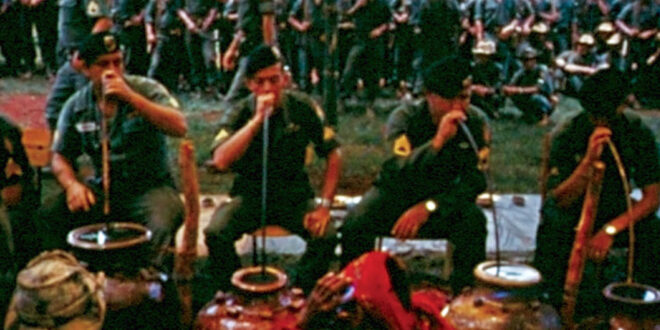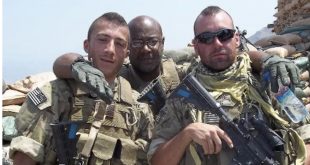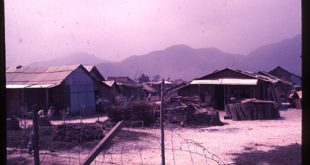The Montagnards were skilled fighters, often engaging in guerrilla tactics, conducting reconnaissance, and staging ambushes against enemy forces.
During the Vietnam War, one of the most remarkable military alliances was between the U.S. Green Berets and the Montagnard tribespeople, indigenous groups who inhabited the Central Highlands of Vietnam. The Montagnards, or “Mountain People,” consisted of approximately 30 tribes. They had a long history of resisting outside influences, having fought various foreign invaders.
READ MORE about Special Forces in Vietnam: Gary Rose, Courageous Special Forces Medic
In the context of the Vietnam War, the U.S. military personnel befriended these locals, both for an alliance in the war and to help them achieve a better quality of life.
The Montagnards had their own distinct languages, cultures, and social structures. They lived in small villages scattered across the mountainous regions, often far removed from government or major urban centers.
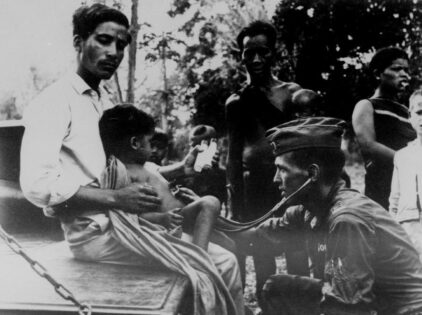
The friendships were not limited to U.S. Army personnel. At Pleiku Air Base, as part of a civic actions program, the 633d 633d Combat Support Group established a relationship with the Montagnards. The Americans provided medical care, helped repair and build infrastructure, and aided in establishing an industry in crossbow making for the locals.
The best known relationship between Montagnards and U.S. forces was that of the tribesmen with the Green Berets (Special Forces). These soldiers, who were tasked with training and organizing local militias as part of a broader counterinsurgency strategy, formed a natural partnership with the mountain people.
The relationship was one of mutual respect. The Montagnards were skilled fighters, often engaging in guerrilla tactics, conducting reconnaissance, and carrying out ambushes against North Vietnamese and Viet Cong units. The tribespeople, in turn, benefited from the military assistance they received and the promise of greater autonomy in the post-war future.
One of the most significant contributions of the Montagnard tribesmen was their role in defending key strategic locations in the Central Highlands. They fought alongside U.S. forces in several critical engagements, including the Battle of Dak To in 1967.
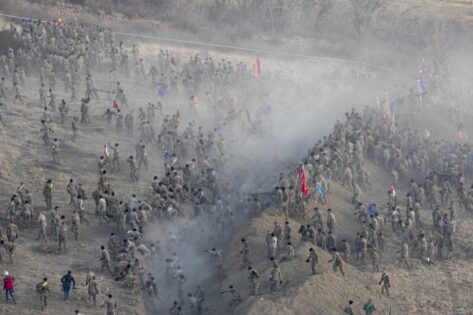
After Saigon fell in 1975, the communist government of Vietnam targeted the tribespeople for working with American forces, leading to brutal reprisals.
Many Montagnards were forced into re-education camps, or fled to refugee camps in neighboring countries. Eventually, some came to live in the United States.
When the leaders of the Montagnards were brought to the U.S., they were asked where they wanted to settle, according to retired U.S. Army Special Forces Master Sgt. George Clark, who spoke to a Defense Department interviewer in 2008. The Montagnards were offered land in Florida and Louisiana, but wanted to be close to where their American friends were based, at Fort Bragg (later renamed Fort Liberty).
According to Clark, the Montagnards explained their preference: “‘We’ve got to be close to the Special Forces. They grew up with us, we grew up with them.’ That’s why they’re in North Carolina.”
The Montagnards remained loyal to their American friends.
Shortly after the events of Sept. 11, a battalion of former soldiers originally from the Central Highlands of Vietnam, Laos and Cambodia, volunteered for the U.S. military engagement in Afghanistan. They wanted no pay. All they asked was for transportation to the region, ammunition and one final condition: that their battalion takes the place of an equal number of American soldiers.
The request was declined, according to an advocate.
The bond between the Green Berets and the Montagnards remains one of the most enduring legacies of the Vietnam War. Their bravery and contributions to the U.S. military effort, often at great personal cost, are an essential chapter in the history of the war.
– Based in part on a story by Spc. Benjamin Watson, 49th Public Affairs Detachment, Fort Bragg, NC.
 Soldier of Fortune Magazine The Journal of Professional Adventurers
Soldier of Fortune Magazine The Journal of Professional Adventurers


